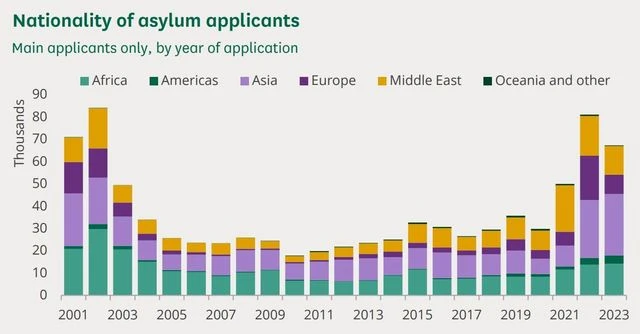As the race to replace Rishi Sunak as leader of the UK’s Conservative Party intensifies, visa policies for Indians have become a hot topic. Against the backdrop of the launch of the Conservative Party conference in Birmingham on Sunday, the two frontrunners, Robert Jenrick and Kemi Badenoch singled out India as one of the countries that should be subjected to tough visa restrictions across all categories unless it takes back its nationals who enter Britain illegally.
Jenrick’s stance on visa restrictions
Click here to connect with us on WhatsApp
Former immigration minister Robert Jenrick has called for tougher visa restrictions, singling out India. His comments come amidst pressure on the UK government to deport illegal migrants. Jenrick said, “The government must stop other countries exploiting our generosity.”
“It is time to play hardball with these countries and refuse to issue visas until they agree to take back their citizens who are living illegally in the UK,” he said.
He pointed out that while India benefited from 250,000 visas last year, around 100,000 Indian nationals are thought to be living in the UK illegally. Jenrick lamented that despite an India-UK Migration and Mobility Partnership, deportations of illegal migrants remain limited. He criticised India’s slow response in taking back its nationals who entered the UK illegally.
Badenoch’s view
Kemi Badenoch, shadow housing secretary and another strong contender in the race, took a similar stance. Speaking to the BBC, she said, “It is quite clear that there are many people who have recently come to this country who have brought views from their countries of origin that have no place here.”
“I saw as equalities minister people bringing cultural disputes from India to the streets of Leicester… we need to make sure that when people come to this country, they leave their previous differences behind. This is not a controversial thing to say”, she said.
Badenoch was referencing cultural clashes from countries like India, specifically pointing to the unrest in Leicester after an India-Pakistan cricket match in 2022. She emphasised the need for migrants to leave their differences behind when settling in the UK.
The leadership contest follows Sunak’s resignation after the party’s defeat in the July general election. Sunak, who continues to serve as interim leader, was re-elected as an MP for Richmond and Northallerton. His future role in British politics remains uncertain as the leadership race continues.
Where do asylum seekers come from?
UK data reviewed by *Business Standard* shows that in 2023, 41% of asylum seekers were from Asian countries, with the largest nationalities being Afghan, Indian, Pakistani, Bangladeshi, and Vietnamese. African nationals accounted for 21%, Middle Eastern for 19%, and European nationals made up 13% of the applicants.
Afghan: 7,800 applicants
Iranian: 6,200 applicants
Indian: 4,800 applicants
Pakistani: 4,300 applicants
Bangladeshi: 3,900 applicants
)
UK Home Office, Immigration Statistics, year ending June 2024
The immigration issue
Immigration has long been a contentious issue in the UK. Concerns range from the strain on housing and public services like the NHS to the impact on social cohesion. In 2010, then-prime minister David Cameron pledged to reduce net migration to below 100,000 per year. However, this target was never achieved.
The 2016 Brexit referendum was, in part, driven by a desire to control immigration. Despite leaving the EU, net migration has continued to rise. In 2022, Indian nationals accounted for around a fifth of total immigration to the UK, followed by Nigerian and Chinese nationals.
Sunak’s immigration cuts
Before stepping down, Sunak took steps to reduce immigration, targeting students and skilled workers. In January, he introduced rules aimed at cutting the number of international students and their dependents. These measures included:
— Raising the salary threshold for skilled worker visas by 48% to £38,700
— Restricting care workers from bringing in dependents
— Banning international students from bringing in family members
The result has been a 79% drop in dependent visa applications by students in the first four months of 2024, 30,000 fewer student visa applications overall, and a 58% fall in applications by dependents of healthcare workers.
Net migration continues to rise
Despite efforts to cut immigration, net migration figures remain high. In 2015, net migration stood at 329,000, and numbers have risen since then. The growing pressure on housing, education, and health services continues to make immigration a key political issue in the UK, with Indian nationals now at the centre of the debate.
First Published: Sep 30 2024 | 1:50 PM IST


































